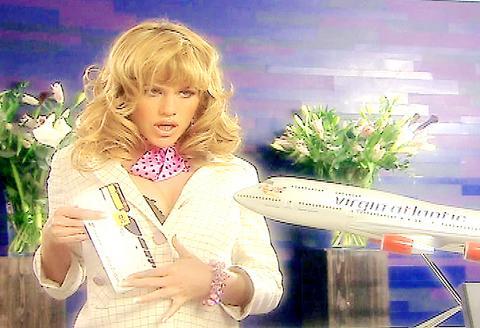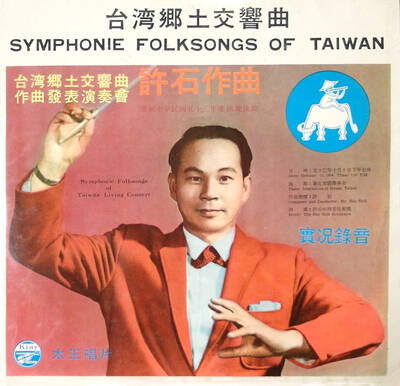Virgin Atlantic Airways is hoping business travelers will say, "Oh, behave!" after seeing a cheeky new commercial, which uses bawdy British humor to spoof cheesy soft-core pornography.
The jest even extends to the choice of media for the parody, which will appear where the intended audience watches actual cheesy soft-core pornography, on the adult-entertainment channels of the closed-circuit television systems in hotel rooms.

PHOTO: NY TIMES
The spoof, almost 10 minutes long, promotes Virgin Atlantic's Upper Class Suite service on flights between London and New York. Though there is no nudity or profanity, there is enough wink-wink, nudge-nudge japery to fill a fourth Austin Powers film.
First, there is the title, "Suite & Innocent," then come woodenly-acted characters, with names like Miles High, Big Ben and Summer Turbulence, who deliver dialogue replete with double-entendres about "your first time" onboard and enjoying "several inches more" of legroom.
The airline's American agency, Crispin Porter & Bogusky in Miami, spent almost US$1 million to produce and place the parody, which is part of a wry campaign carrying the theme "Go jet set, go!" that also includes droll seat-pocket safety cards and an in-flight magazine called Jetrosexual.
The commercial will be available from this week through the end of the year on the Adult Desires pay-per-view channel on hotel TV networks operated by the LodgeNet Entertainment Corp. Hotel guests will find it listed among real films like Girl-on-Girl and As Wet as They Come, but unlike them the parody can be watched free.
The spoof is emblematic of efforts by advertisers to make media choices outside traditional realms like broadcast television or direct mail to reach busy contemporary consumers. Crispin Porter has become known for such offbeat projects, from a Web site for Burger King presenting an accommodating fowl in a garter belt (subservientchicken.com) to mock contracts bound into magazines stipulating owners of Mini Cooper convertibles must drive with the tops down "for at least 90 percent" of their rides.
"We were trying to figure out the best way to reach these highly elusive business travelers," said Chris Rossi, vice president for North American sales and marketing at the Norwalk, Connecticut, office of Virgin Atlantic, part of the Virgin Group, "and this is where they're spending time." The airline's research found that 78 percent of the target market stays at hotels equipped with LodgeNet pay-per-view channels, he said.
The provocative nature of the project is unusual, Rossi acknowledged, but "people expect us to be irreverent."
The plot, such as it is, is centered on a buxom blonde, the chief executive of a lingerie company, who enjoys a business trip from New York to London in a Virgin Atlantic Upper Class Suite. In one scene, a venture capitalist she meets on board offers to invest in her company, and as he writes a check for US$100 million, she recites aloud each zero by moaning, "Oh, oh, oh, oh."
When he is finished, she whips out a digital camera and snaps the check. "Voila," he exclaims, "the money shot."
In another scene, a woman getting an in-flight massage is interrupted by a hunk carrying a wrench, who proclaims, "I've come to fix your pipes." A Virgin Atlantic employee tells him: "I'm afraid you've wandered into the wrong movie. You're one channel over."
The cast enthusiastically mocks the conventions of soft-core pornography by continuously delivering lines with double meanings; the women sigh and moan and the men speak in gruff growls. The cast overacts each scene by performing any activity, from getting a shoeshine to pouring hot fudge on an ice-cream sundae, in a sexually suggestive manner.
The parody ends with text on screen identifying Virgin Atlantic as the sponsor and offering a frequent-flier reward for watching.
"Where you tell your friends you saw this offer," the text reads, "well, that's entirely up to you."

The depressing numbers continue to pile up, like casualty lists after a lost battle. This week, after the government announced the 19th straight month of population decline, the Ministry of the Interior said that Taiwan is expected to lose 6.67 million workers in two waves of retirement over the next 15 years. According to the Ministry of Labor (MOL), Taiwan has a workforce of 11.6 million (as of July). The over-15 population was 20.244 million last year. EARLY RETIREMENT Early retirement is going to make these waves a tsunami. According to the Directorate General of Budget Accounting and Statistics (DGBAS), the

Last week the Chinese Nationalist Party (KMT) announced that the legislature would again amend the Act Governing the Allocation of Government Revenues and Expenditures (財政收支劃分法) to separate fiscal allocations for the three outlying counties of Penghu, Kinmen and Matsu from the 19 municipalities on Taiwan proper. The revisions to the act to redistribute the national tax revenues were passed in December last year. Prior to the new law, the central government received 75 percent of tax revenues, while the local governments took 25 percent. The revisions gave the central government 60 percent, and boosted the local government share to 40 percent,

Many will be surprised to discover that the electoral voting numbers in recent elections do not entirely line up with what the actual voting results show. Swing voters decide elections, but in recent elections, the results offer a different and surprisingly consistent message. And there is one overarching theme: a very democratic preference for balance. SOME CAVEATS Putting a number on the number of swing voters is surprisingly slippery. Because swing voters favor different parties depending on the type of election, it is hard to separate die-hard voters leaning towards one party or the other. Complicating matters is that some voters are

Sept 22 to Sept 28 Hsu Hsih (許石) never forgot the international student gathering he attended in Japan, where participants were asked to sing a folk song from their homeland. When it came to the Taiwanese students, they looked at each other, unable to recall a single tune. Taiwan doesn’t have folk songs, they said. Their classmates were incredulous: “How can that be? How can a place have no folk songs?” The experience deeply embarrassed Hsu, who was studying music. After returning to Taiwan in 1946, he set out to collect the island’s forgotten tunes, from Hoklo (Taiwanese) epics to operatic